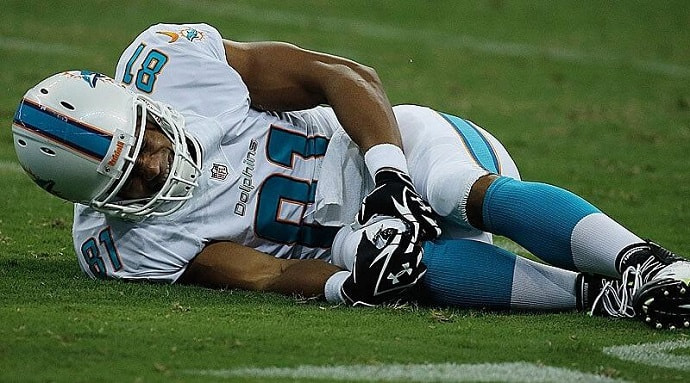For anyone who exercises regularly or is a competitive athlete, the reality is that you will experience some form of injury in your life. It’s not until the onset of injury that people think it will happen to them, but unfortunately, it does. Strategies for preventing injury include diet, hydration, sleep, cold-water immersion and prehabilitation exercises. With this in mind, nutrition interventions play a vital role in alleviating the risk of injury to maintain training volume and intensity, and ultimately, enhancing performance.
Here are some preventative measures from a nutritional perspective that may help to avoid injury.
1. Body composition
Monitoring body composition is important for health, performance but also for injury prevention. Low levels of lean muscle mass and high body fat levels are both associated with increased risk of injury. Unwanted excess body weight can negatively impact mechanical stress during exercise, thus causing musculoskeletal related injuries. As we age the ratio between lean and fat mass can negatively influence health, therefore it’s important to regularly monitor your body composition and structure your training (resistance/weight-training) and diet (following nutritional timing and strategies) to alleviate this natural alteration in body composition.
2. Energy deficit
Insufficient energy intake like during periods of deliberate weight loss may accentuate fatigue and impair recovery. When the diet lacks enough calories to support the body during periods of intense training, nutrients may be sourced from within the body to support physiological functions. For example, when dietary protein is inadequate, skeletal muscle may be broken down to fuel protein requirements, thus reducing lean muscle mass and increasing muscle injury risk. It is important for adequate energy intake to provide the nutrients required to fuel exercise and recover optimally.
3. Recovery
Recovering from exercise is essential to help repair any damaged tissues and replenish energy stores to fuel repeated exercise performance. Dietary protein is known for its role in lean tissue repair and growth so it is recommended to consume 20-30g after training, as part of a daily intake of 1.6-2.5g per kg body mass depending on training requirements. Alongside protein, post-exercise carbohydrate ingestion is also advocated to promote muscle glycogen synthesis to perform subsequent high-intensity training. Again, total daily carb intake for athletes should be based on training volume and intensity, and if you are physically active then intake should be between 3-7g/kg. Other areas of nutrition required to maximise recovery can be found here in last week’s blog on the 4 R’s of recovery.
4. Dietary fat
For sports performance dietary protein and carbohydrates get the headlines for their role in protein synthesis and energy availability, however dietary fat is equally important for performance health. Overconsumption of certain fats may negatively influence injury risk, due to the pro-inflammatory properties of excessive trans and omega-6 fatty acids. Anti-inflammatory omega-3 fatty acids should be prioritised to promote immune function, protein synthesis, brain function and recovery from exercise. Saturated fat intake should also be controlled; it is important for anabolic hormone production and structuring cell membranes, but too much may impair performance and increase fat mass due to its high calorie value.
5. Micronutrient deficiency
Diets that lack important nutrients leave the body in a state of nutrient deficiency that can impair physiological function and cause injury. When blood levels of nutrients are low, the body will source it from internal stores (endogenous production), for example, calcium may be extracted from bone when blood calcium levels are low. This can ultimately leave you prone to bone injuries. Eating a rainbow a day is an effective technique to obtain all the nutrients required to optimise performance and boost recovery.
6. Vitamin D
Vitamin D deficiency is extremely common, particularly in the UK due to extreme cloud coverage and poor annual sunlight exposure. Vitamin D plays a vital role in bone and calcium homeostasis, immune function and muscle health, and is associated with increased injury incidence when vitamin D status is low. Dietary sources lack enough vitamin D to fully satisfy the body’s needs, so during winter months it is recommended to supplement with vitamin D3 at a dose of 2000-4000 IU/day to prevent deficiency and fight against infection.
7. Hydration
Maintaining hydration in sport is vital for exercise performance and dehydration can lead to injury if not regulated. As little as 2% losses in body water can lead to significantly impaired performance, and if you do not rehydrate with sufficient fluids and electrolytes lost through sweating, this may impact muscle contraction, nutrient transport, and thermoregulation. Therefore, hydration testing in athletes is important while training and exercising.
8. Alcohol
Post-exercise alcohol ingestion impairs recovery and adaptations to training by blunting rehydration, protein and glycogen synthesis. Even when co-ingested with protein, alcohol suppresses the anabolic response in skeletal muscle, and carbohydrate ingestion only partially offsets the deleterious effects of alcohol on muscle glycogen resynthesis. Alcohol should therefore not be ingested in close proximity to exercise to maximise recovery and training adaptations, and boost subsequent performance and reduce the risk of injury.
Take home points
- Body composition is associated with injury risk – high levels of body fat particularly abdominal fat may be a good predictor of musculoskeletal injury risk. Aim to improve the ratio of lean tissue and fat mass.
- Avoid being in an energy deficit during periods of intense training. If you compete in a make-weight sport then ensure energy restriction is not too severe and sufficient protein, carbohydrate and micronutrient intake is provided to support training intensity and recovery, as well as avoid vitamin and mineral deficiencies.
- Refuel properly after training with sufficient protein, carbohydrates and fluids to maximise recovery to promote subsequent performance.
- Avoid excessive omega-6, saturated and trans fats and regularly consume omega-3 rich foods like oily fish or include a daily supplement.
- Avoid vitamin D deficiency to support many physiological functions and reduce risk of injury, which is linked to low vitamin D levels.
- Avoid pre- and post-exercise alcohol consumption to boost performance and recovery, and avoid injury risk.
Also Learn: Rugby Player Diet.






